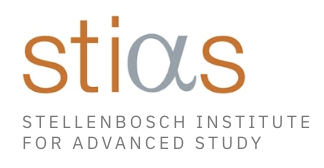Stellenbosch Institute for Advanced Study (STIAS)

STIAS, A CREATOR OF NEW KNOWLEDGE
In today’s knowledge society accessing reliable, appropriate, future-orientated, ground-breaking knowledge and being able to process the technologies and know-how that flows from this knowledge is key. It is also critical to nurture a future generation of independent thinkers and leaders. Leaders who not only understand the realities of a changing world, but also have the abilities and skills to implement new advances to the benefit of society.
The Stellenbosch Institute for Advanced Study invests in experts who work across disciplinary borders to tackle issues ranging from health equity to complexity theory, the effects of race to quantum information. In this age of tumultuous change, the development of a long-term view and a critical mass of expertise on a broad range of issues is crucial to the wellbeing of future generations.
STIAS was established in 1999 to provide a ‘creative space for the mind’, a fellowship programme that would advance cross-disciplinary research at the highest level. Modelled on similar institutes internationally, STIAS is the first of its kind in Africa. Here, leading researchers and intellectuals from across the world are supported to think innovatively and pursue sustainable strategies to the challenges facing the world, with a focus on Africa. Offering various fellowships and scholarships, STIAS provides a uniquely supportive space for thinking, reading, debating and writing. While in residence, established and early-career researchers and artists meet daily over lunch, present and participate in weekly seminars, and organise conferences for a wider audience. In creating and curating this space, STIAS provides ideal conditions for innovative and original thinking to thrive.
In order for us all to be part of tomorrow’s discoveries and breakthroughs, we must invest today in the development of our brightest minds. STIAS is meant to be a beacon of hope in this regard. Despite the challenges Africa is facing, it has great potential to deal with these and find enduring solutions.
DR. PETER WALLENBERG
The Wallenberg Research Centre
Formally opened on 15 November 2007, the Wallenberg Research Centre at STIAS provides modern facilities for Fellows, as well as multipurpose conference accommodation to bring scholars, researchers, decision-makers, and civil society together. This building was made possible through a generous R28-million donation from the Marianne and Marcus Wallenberg Foundation of Sweden. The Centre provides private space and state-of-the-art equipment for up to 30 fellows at a time, as well as seminar facilities. Here, fellows can enjoy a place, space, working conditions and congenial atmosphere that allows for productive scholarly interaction and innovative thinking. The building’s individual, soundproofed study rooms offer optimal privacy for concentrated and undisturbed work, while its communal areas encourage interaction for exchanging viewpoints and perspectives to stimulate new thought. In designing the centre, architect Hein Visser’s aim was “to ensure the feeling of free-flowing space which sets no limits to the mind, opening new vistas and unexpected perspectives”. The building also had to respect the tradition of the adjoining historic 19th-century structures at Mostertsdrift. To connect old and new, Visser used “the historic leivoor [irrigation stream] running in front of the manor house and cellar as the planning axis”, with three water features to “symbolise the continuation of the leivoor and form the spine of the new building”. The emphasis is on low energy consumption and maintenance, with use of double glazing and solar heating. The water-wise garden is filled with plants indigenous to the Western Cape. Those who work and visit the Centre are constantly aware of the Jonkershoek Valley and the natural beauty surrounding them. The spacious south terrace overlooks the vineyard and the mountains, and the fellows’ offices offer views of the garden, manor house, and mountains. In such an environment, STIAS expects its projects to continue to grow and expand, and for the solutions and new knowledge they bring to endure, and to benefit and reward the researchers, country and continent.
EXPLORE STIAS' RESEARCH FACILITIES →
Explore STIAS' key programmes
STIAS encourages the cross-pollination of ideas across cultures, academic or otherwise, and hence gives preference to projects that will tap into, and benefit from, a multi-disciplinary discourse while also contributing unique perspectives to such a discourse. This interaction is fostered by inviting individual fellows or project teams where each team member is evaluated individually.